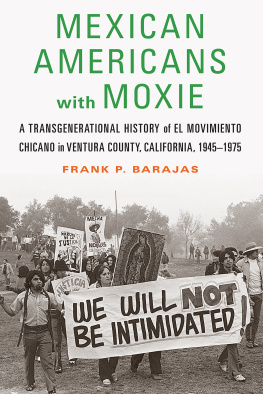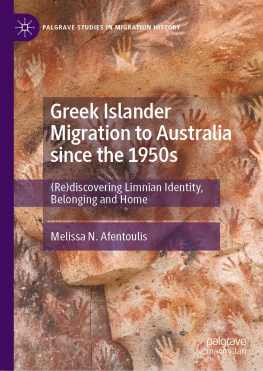THE XARIPU COMMUNITY ACROSS BORDERS
LATINO PERSPECTIVES
Gilberto Crdenas, series editor
The Institute for Latino Studies, in keeping with the distinctive mission, values, and traditions of the University of Notre Dame, promotes understanding and appreciation of the social, cultural, and religious life of U.S. Latinos through advancing research, expanding knowledge, and strengthening community.
THE XARIPU COMMUNITY ACROSS BORDERS
Labor, Migration, Community, and Family
MANUEL BARAJAS
University of Notre Dame Press
Notre Dame, Indiana
Copyright 2009 by University of Notre Dame
Notre Dame, Indiana 46556
www.undpress.nd.edu
All Rights Reserved
Manufactured in the United States of America
Library of Congress Cataloging-in-Publication Data
Barajas, Manuel.
The Xaripu community across borders : labor migration, community, and family / Manuel Barajas.
p. cm. (Latino perspectives)
Includes bibliographical references and index.
ISBN-13: 978-0-268-02212-9 (pbk. : alk. paper)
ISBN-10: 0-268-02212-7 (pbk. : alk. paper)
1. Indians of MexicoCaliforniaSocial conditions. 2. Mexican AmericansCaliforniaSocial conditions. 3. Michoacn de Ocampo (Mexico)Emigration and immigration. 4. Alien laborCalifornia. 5. Transnationalism. I. Title.
F870.M5B37 2009
304.8'79407237dc22
2009004336
The paper in this book meets the guidelines for permanence and durability of the Committee on Production Guidelines for Book Longevity of the Council on Library Resources.
ISBN 9780268076245
This e-Book was converted from the original source file by a third-party vendor. Readers who notice any formatting, textual, or readability issues are encouraged to contact the publisher at .
A mi pueblo y a otros que buscan igualdad y humanidad atravesando fronteras injustas.
(To my pueblo and others who seek equality and humanity crossing unjust borders.)
CONTENTS
I want to recognize the people who made the completion of this book possible. Alfredo Mirand spent enormous amounts of time providing me feedback and mentorship throughout my dissertation work. Edna Bonacich, Scott Coltrane, Devra Weber, and Michael Kearney were also very helpful with their expertise, feedback, and encouragement. I benefited tremendously by the continuous academic and personal support of Refugio I. Rochin, Adaljisa Sosa-Riddell, and Beatriz Pesquera since my undergraduate years at UC Davis. They affirmed the social and academic value of my cultural background and labor migrant experiences. To friends and scholars who helped with feedback, I thank Esther Barajas, Mario Barrera, Katherine Blackmer Reyes, Duane Campbell, Julia Curry-Rodriguez, Verica Dering, Glenn Destatte, Gilberto Garcia, Marlyn Jones, Enrique Lopez, Richard Lowy, Luis Magaa, Cecilia Menjvar, Gabriel Torres, Gregorio Mora-Torres, Luisa Moreno Briseo, Alvaro Ochoa Serrano, Patricia Portillo, Mariano Salcedo Zaragoza, Otis Scott, and Edith Vasquez. I am very grateful to the resource help of UC MEXUS, Ernesto Galarza Public Policy Center, El Colegio de Michoacn, and Instituto de la Revolucin Mexicana en Jiquilpan. At the University of Notre Dame Press, I am thankful for the editorial support of Kari Jo Verhulst and for the generous support of Caroline Domingo and Gilberto Crdenas. For offering me a home during my research in California, I thank my parents (Esther and Luis), sisters (Sylvia, Esther, Evelyn), and brothers (Luis, Jorge, and David), who live in Stockton, California. In Michoacn, my godparents (Carlos Manzo and Juana Pulido) and cousins (Ofelia and Carlos Manzo) hosted me in Xaripu and my great aunt (Esperanza Carrillo Diaz) in Zamora. Gracias por su hospitalidad.
This book was made possible by la cuperacha de todas/os las/los de Xaripu in both California, United States, and Michoacn, Mexico. Gracias, mi pueblo. Alitzel eres mi llaves a la felicidad. Elvia Ramirez, mi compaera y esposa, whom I love very much, thanks for your ardent support of me and my work.
Labor Migration, Community, and Family across Borders
An unjust law is a human law that is not rooted in eternal law and natural law. Any law that uplifts human personality is just. Any law that degrades human personality is unjust. All segregation statutes are unjust because segregation distorts the soul and damages the personality.
Martin Luther King Jr. ([1963] 2003)
On December 16, 2005, the House of Representatives passed House Resolution 4437, which threatened to further militarize the southern border and criminalize as felons undocumented immigrants and those assisting them in any way (Nevins 2002, 6162, 6869, 74, 78). Like Martin Luther King a generation ago, the Roman Catholic cardinal Roger Mahony instructed his priests to disobey HR 4437 if it became law, arguing that denying aid to a fellow human being violates a higher authority than Congressthe law of God (Fetzer 2006, 698). In 2007, competing interests in the US Congress continued to debate the content of a national immigration act and revealed the historical contradictions of immigration policy, between capital and labor, economic structural demands and nativism, and the ideals of an open society and rigid border control (Calavita 1998; Carens 1998). In line with the historical trajectory of US immigration policymaking,1 any likely compromise-based immigration actwith its emphasis on border security, exploitable and disposable guest workers, and a burdensome path to legalizationwould keep immigrants of color marginalized from the economic and social center of US society for generations to come (Calavita 1998, 98).2
This book illustrates the long-term consequences of national borders on both the sending and the receiving societies. It presents an extended case study of the Xaripu community originating from Michoacn, Mexico, and elaborates how various forms of colonialism, institutional biases, and emergent forms of domination have shaped the communitys labor migration, community formation, and family experiences across the Mexican and US border for over a century. The Xaripu people generally constitute a transnational community with home bases in both Xaripu, Michoacn, and Stockton, California, and reflect a high level of transnationalismthat is, they feel at home in the two nations and maintain active and fluid social ties across borders. A total of fifty-six persons participated in the formal study on which this book is partly based: thirty-one in California and twenty-five in Michoacn (the concept of transnationalism and the methodology for this extended case study are elaborated in ).
Among the central questions guiding this book are the following: What historical events have shaped Xaripus migration experiences? How have Xaripus been incorporated into the US labor market? How have national inequalities affected their ability to form community across borders? And how have migration, settlement, and employment experiences affected the family, particularly gender relationships, on both sides of the border?
People from the pueblo of Xaripu began coming to the United States at the turn of the twentieth century, but it took three generations of migrating before Xaripus began settling permanently in





